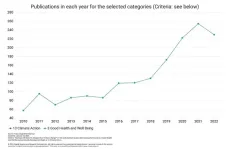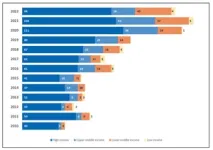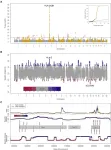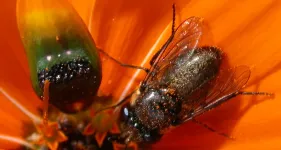(Press-News.org) Whether it’s diseases from bats, birds, pigs, or mosquitoes, climate change brings with it an increased risk of animal-borne (or “zoonotic”) diseases that can transmit to humans.
Digital Science, a technology company serving stakeholders across the research ecosystem, has today released its analysis of the global research response to climate change and zoonotic diseases, in the context of the United Nations’ Sustainable Development Goals (SDGs) on climate and health.
Using data from Dimensions, Dr Briony Fane, Ann Campbell and Dr Juergen Wastl from Digital Science have explored published research, research funding, policy documents, and citation data. Using Google BigQuery (GBQ), they also integrated data from Dimensions with one of the publicly available World Bank datasets.
The authors have highlighted global disparities in funding for research, research collaborations, and recognition for research based on geographical and socio-economic location.
They write: “What is apparent is that governments around the world are investing large sums of money as part of the global mission to halt the spread of animal diseases and to protect the public against zoonotic disease outbreaks before they become pandemics that pose a risk globally.
“Many of the health impacts associated with climate change are a particular threat to the poorest people in low- and middle-income countries where the burden of climate sensitive diseases is the greatest.”
Their findings highlight:
Research publications in the fields of zoonotic diseases and climate change have increased more than two-fold since the implementation of the SDGs in 2016.
The representation of low-income country researchers in these fields of research is 40 times greater than high-income country researchers.
Government organisations and non-profit agencies in the Global North (broadly speaking, developed nations) award much of their funding for research in these fields in the Global South (developing nations).
Research collaboration patterns reveal that researchers in Global South countries are more likely to collaborate with researchers in the Global North than vice versa.
Despite being strongly represented in these fields, research carried out on zoonotic diseases and climate change in lower income countries is less well cited by higher income countries.
See the full analysis on the Digital Science website.
About Dimensions
Part of Digital Science, Dimensions is the largest linked research database and data infrastructure provider, re-imagining research discovery with access to grants, publications, clinical trials, patents and policy documents all in one place. www.dimensions.ai
About Digital Science
Digital Science is a technology company working to make research more efficient. We invest in, nurture and support innovative businesses and technologies that make all parts of the research process more open and effective. Our portfolio includes admired brands including Altmetric, Dimensions, Figshare, ReadCube, Symplectic, IFI CLAIMS Patent Services, Overleaf, Ripeta, Writefull, and metaphacts. We believe that together, we can help researchers make a difference. Visit www.digital-science.com and follow @digitalsci on Twitter or on LinkedIn.
Media contacts
David Ellis, Press, PR & Social Manager, Digital Science: Mobile +61 447 783 023, d.ellis@digital-science.com
Simon Linacre, Head of Content, Brand & Press, Digital Science: Mobile: +44 7484 381477, s.linacre@digital-science.com
END
Disparities in the research effort to combat animal-borne diseases amid climate change
Analysis of the global research landscape now available
2023-03-23
ELSE PRESS RELEASES FROM THIS DATE:
Patient-specific cells generated from thymus organoids
2023-03-23
Researchers have used pluripotent stem cells to make thymus organoids that support the development of patient-specific T-cells, researchers report March 23rd in the journal Stem Cell Reports. The proof-of-concept work provides the basis for studying human thymus function, T-cell development, and transplant immunity.
“We have established the framework for further basic science and translational research interrogating human thymus development and function in vitro, and in a patient-specific manner,” says senior author Holger Russ, of the University ...
Early European farmers borrowed genes from hunter-gatherers to survive disease
2023-03-23
When early Stone Age farmers first moved into Europe from the Near East about 8,000 years ago, they met and began mixing with the existing hunter-gatherer populations. Now genome-wide studies of hundreds of ancient genomes from this period show more hunter-gatherer ancestry in adaptive-immunity genes in the mixed population than would be expected by chance.
The findings, reported in Current Biology on March 23, suggest that mixing between the two groups resulted in mosaics of genetic variation that were acted upon by natural selection, a process through which all organisms, including humans, adapt and change ...
Deceptive daisy’s ability to create fake flies explained
2023-03-23
A male fly approaches a flower, lands on top of what he thinks is a female fly, and jiggles around. He’s trying to mate, but it isn’t quite working. He has another go. Eventually he gives up and buzzes off, unsuccessful. The plant, meanwhile, has got what it wanted: pollen.
A South African daisy, Gorteria diffusa, is the only daisy known to make such a complicated structure resembling a female fly on its petals. The mechanism behind this convincing three-dimensional deception, complete ...
Ancient genomes reveal immunity adaptation in early farmers
2023-03-23
Francis Crick Institute press release
Under strict embargo: 15:00hrs GMT 23 March 2023
Peer reviewed
Observational study
People
Research from the Francis Crick Institute published today in Current Biology has revealed that diversity in genes coding for immunity may have facilitated adaptation to farming lifestyles in prehistoric periods.
Researchers at the Ancient Genomics Laboratory at the Crick studied available genome-wide DNA from 677 individuals dating to Stone Age Europe, spanning the movement of Neolithic farmers from the Near East into Europe about 8000 years ago, where they mixed with Mesolithic hunter-gatherers already in Europe.
They were interested in whether ...
Vaccination halves risk of long COVID, largest study to date shows
2023-03-23
Being vaccinated against Covid halves people’s risk of developing long Covid, according to new research from the University of East Anglia.
Long Covid still affects some two million people in the UK, and new research published today reveals the risk factors associated with developing the condition.
Overweight people, women, smokers and those over the age of 40 are also more likely to suffer from long Covid according to the study - which includes more than 860,000 patients and is thought to be the largest of its kind.
The study also finds that co-morbidities such as asthma, COPD, Type 2 Diabetes, coronary heart disease, immunosuppression, anxiety ...
Risk factors associated with post−COVID-19 condition
2023-03-23
About The Study: This systematic review and meta-analysis of 41 studies including 860,000 patients found that certain demographic characteristics (e.g., age and sex), comorbidities, and severe COVID-19 were associated with an increased risk of post−COVID-19 condition (PCC; also known as long COVID), whereas vaccination had a protective role against developing PCC sequelae. These findings may enable a better understanding of who may develop PCC and provide additional evidence for the benefits of vaccination.
Authors: Vassilios ...
Association of treatment with nirmatrelvir and the risk of post–COVID-19 condition
2023-03-23
About The Study: This cohort study found that in people with SARS-CoV-2 infection who had at least one risk factor for progression to severe disease, treatment with nirmatrelvir within five days of a positive SARS-CoV-2 test result was associated with reduced risk of post−COVID-19 condition (also known as long COVID) across the risk spectrum in this cohort and regardless of vaccination status and history of prior infection. The totality of the findings suggests that treatment with nirmatrelvir ...
Mental distress among female individuals of reproductive age after overturning of Roe v Wade
2023-03-23
About The Study: This case control study found that for female individuals, the loss of abortion rights was associated with a 10% increase in prevalence of mental distress relative to the mean over the three months after the Supreme Court of the U.S. decision. Restricting legal abortion access may be associated with disproportionate outcomes among individuals of lower socioeconomic status and in medically underserved areas, who may experience greater economic and mental health burdens of having unwanted pregnancies due to increased travel costs of obtaining abortions.
Authors: Muzhe Yang, Ph.D., of Lehigh University in Bethlehem, ...
SARS‐CoV‐2 infection during pregnancy linked to higher risk of neurodevelopmental disorders in male infants
2023-03-23
BOSTON – New research led by investigators at Massachusetts General Hospital (MGH), a founding member of Mass General Brigham (MGB), found that males but not females born to mothers with SARS‐CoV‐2 infection during pregnancy were more likely to receive a neurodevelopmental diagnosis in the first 12 months after delivery. The findings are published in JAMA Network Open.
Previous studies have found associations between other infections during pregnancy and increased risk of neurodevelopmental disorders in children, such as autism spectrum disorder, but it’s unclear if such a link exists with SARS‐CoV‐2 infection during pregnancy. To investigate, ...
Sylvester Cancer investigators find disparities in mesothelioma survival due to social determinants, limited access
2023-03-23
MIAMI, FLORIDA (EMBARGOED UNTIL THURSDAY, MARCH 23, 2023, AT 11 A.M. ET) – Treatment outcomes for patients with malignant pleural mesothelioma, a rare cancer commonly known as mesothelioma, are often affected by social determinants of health and overall survival rates could be improved by addressing these health disparities and improving access to specialized care.
That’s the key takeaway from new research published March 23 by investigators at the Sylvester Comprehensive Cancer Center at the University of Miami Miller School of Medicine and collaborators, whose study appears in the journal JAMA Network Open.
“We found that mesothelioma patients who ...
LAST 30 PRESS RELEASES:
Scientists identify smooth regional trends in fruit fly survival strategies
Antipathy toward snakes? Your parents likely talked you into that at an early age
Sylvester Cancer Tip Sheet for Feb. 2026
Online exposure to medical misinformation concentrated among older adults
Telehealth improves access to genetic services for adult survivors of childhood cancers
Outdated mortality benchmarks risk missing early signs of famine and delay recognizing mass starvation
Newly discovered bacterium converts carbon dioxide into chemicals using electricity
Flipping and reversing mini-proteins could improve disease treatment
Scientists reveal major hidden source of atmospheric nitrogen pollution in fragile lake basin
Biochar emerges as a powerful tool for soil carbon neutrality and climate mitigation
Tiny cell messengers show big promise for safer protein and gene delivery
AMS releases statement regarding the decision to rescind EPA’s 2009 Endangerment Finding
Parents’ alcohol and drug use influences their children’s consumption, research shows
Modular assembly of chiral nitrogen-bridged rings achieved by palladium-catalyzed diastereoselective and enantioselective cascade cyclization reactions
Promoting civic engagement
AMS Science Preview: Hurricane slowdown, school snow days
Deforestation in the Amazon raises the surface temperature by 3 °C during the dry season
Model more accurately maps the impact of frost on corn crops
How did humans develop sharp vision? Lab-grown retinas show likely answer
Sour grapes? Taste, experience of sour foods depends on individual consumer
At AAAS, professor Krystal Tsosie argues the future of science must be Indigenous-led
From the lab to the living room: Decoding Parkinson’s patients movements in the real world
Research advances in porous materials, as highlighted in the 2025 Nobel Prize in Chemistry
Sally C. Morton, executive vice president of ASU Knowledge Enterprise, presents a bold and practical framework for moving research from discovery to real-world impact
Biochemical parameters in patients with diabetic nephropathy versus individuals with diabetes alone, non-diabetic nephropathy, and healthy controls
Muscular strength and mortality in women ages 63 to 99
Adolescent and young adult requests for medication abortion through online telemedicine
Researchers want a better whiff of plant-based proteins
Pioneering a new generation of lithium battery cathode materials
A Pitt-Johnstown professor found syntax in the warbling duets of wild parrots
[Press-News.org] Disparities in the research effort to combat animal-borne diseases amid climate changeAnalysis of the global research landscape now available





